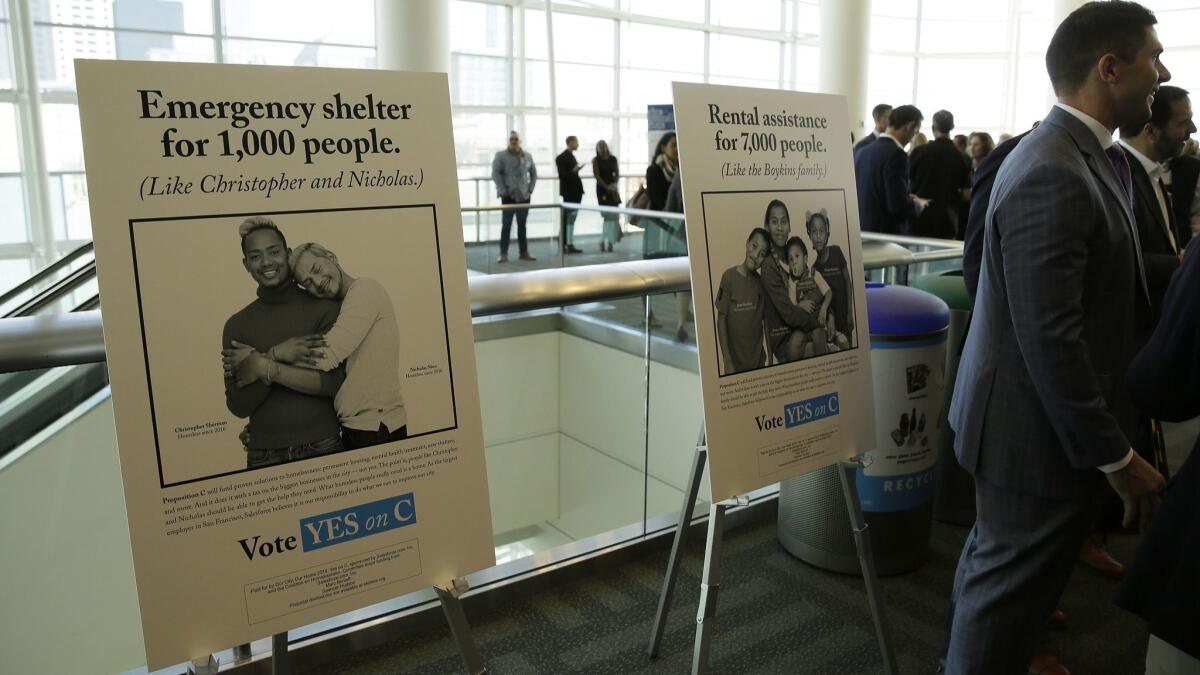San Francisco voters appear on verge of adopting contentious homeless tax measure

- Share via
With ballots from just a few precincts left to count Tuesday night, San Francisco voters appeared to give handy approval to a ballot measure that will tax corporate businesses to fund services for the homeless.
Proposition C, a tax on gross annual receipts of the city’s largest companies, will nearly double San Francisco’s budget dedicated to the curbing homelessness by adding $300 million a year to fund housing, shelters, mental health services and preventive measures.
About 400 businesses, which make up the top 20% of the city’s job base, will be subject to the tax, according to an analysis by City Controller Ben Rosenfield.
The city already taxes businesses on the total amount they receive each year. Proposition C will impose an additional tax, of varying amounts but about 0.5%, on businesses with receipts of $50 million or more. Businesses with more than $1 billion in receipts and 1,000 employees nationwide will pay 1.5% of payroll expenses.
Half the money goes toward housing programs, including short-term and permanent rent subsidies, as well as permanent supportive housing. A quarter provides services for people with mental health issues or drug or alcohol addiction.
The heads of two of San Francisco’s biggest companies lead the pushes for and against the tax. Marc Benioff, chief executive of Salesforce, the city’s largest private employer, supported it, while Twitter and Square Chief Executive Jack Dorsey opposed it.
The campaign in favor of Proposition C, “Our City, Our Home,” raised about $5.6 million, including $1 million from Benioff personally and more than $4 million from Salesforce, CityLab reported. The campaign against it raised significantly less: About $1.4 million, with the biggest donors including Visa and Stripe.
Last month, Benioff and Dorsey took to Twitter to hash out their opinions.
“Homelessness is all of our responsibility,” Benioff said in an Oct. 8 tweet.
In a response a few days later, Dorsey said he’d rather let new San Francisco Mayor London Breed address the issue.
“I want to help fix the homeless problem in SF and California,” he said. “I don’t believe this (Prop C) is the best way to do it.”
Breed, a Democrat, was also against the proposition. Last month, she released a statement saying it lacks accountability, throws money at an issue that can’t be solved that simply, and could make it harder to fund homelessness services — if opponents sue to invalidate it — by rendering the money inaccessible.
“We all recognize the crisis on our streets; we see it every day,” she wrote. “So I understand why Proposition C sounds appealing, and I know those who support it are well-intentioned. But as mayor, I must weigh more than popularity and good intentions.”
andrea.castillo@latimes.com | Twitter: @andreamcastillo
UPDATES:
11:41 p.m.: This article was updated to reflect that measure is leading with nearly all precincts counted.
10:50 p.m.: This article was updated with early election returns.
This article was originally published at 3:30 a.m.
More to Read
Sign up for Essential California
The most important California stories and recommendations in your inbox every morning.
You may occasionally receive promotional content from the Los Angeles Times.














